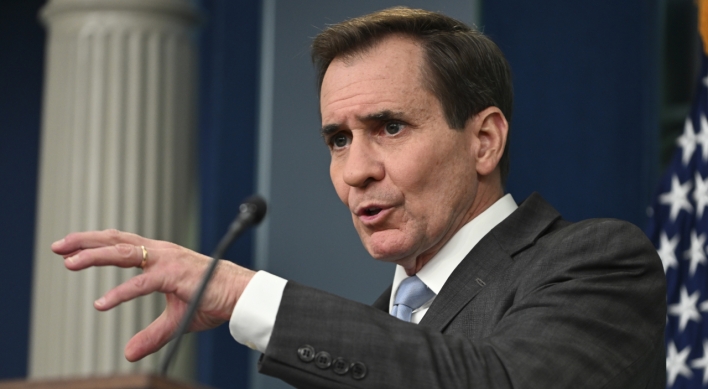Solid fundamentals, foreign investors’ bond purchases boost value of the local currency
The Korean won stays strong amid a flurry of reports that its value might go up further on the strength of foreign investors opting for Korean bonds.
The local currency strengthened 2.5 percent as of Feb. 24 from of January against the U.S. dollar, outpacing the euro (0.9 percent) and the Japanese yen (1.8 percent), according to the Bank of Korea.
HSBC said in a recent report that the Korean won is likely to firm up the most among Asian currencies, citing the stable flow of the currency and the relatively solid fundamentals of the Korean economy.
Barclays Capital earlier said in a report that the Korean won would continue to rise against the U.S. dollar, as Korean policymakers seem ready to handle the current exchange level without undermining the country’s exports.
Asia’s fourth-largest economy grew 0.4 percent in the fourth quarter last year from the previous quarter, hurt by the protracted eurozone debt woes. The trade account in January also swung to a deficit of $1.95 billion. The BOK projected the Korean economy would expand 3.7 percent.
Given the mixed bag of data about the country’s economy, foreign investors seem to be playing a bigger role in the rise of the Korean won against the greenback, particularly in connection with their purchase of Korean bonds, analysts said.
The local currency hit a peak of 1,058.49 won in July last year but lost ground to 1,150.25 won in October due to the downgrade of U.S. credit rating and the acceleration of Europe’s fiscal debt crisis.
In the following months, however, the won began to stabilize noticeably and the exchange rate stood at 1,144.56 won last month. The currency is now traded at a range between 1,120 won and 1,130 won.
Volatility of the Korean won has long concerned policymakers as well as the country’s exporters. On top of regulatory moves, the Korean government took steps to reduce short-term foreign debt and strengthen its guard against external shocks in order to reduce the won’s volatility.
The foreign exchange market here, however, might go through a turbulent period this year as two major elections are scheduled and the geopolitical risk related to North Korea remains the same.
The stronger won is reconfiguring the favored group list on the stock market. Last year, technology and automotive stocks surged, helped by the won’s weakening that resulted in better competitiveness of Korean goods overseas. This year, materials and refinery stocks that move closely with the prices of imported goods are gaining ground on the KOSPI.
Daishin Securities analyst Park Joong-seop said retail investors should pay attention to sectors such as chemicals, which will likely benefit from the higher value of the Korean won.
By Yang Sung-jin (insight@heraldcorp.com)
The Korean won stays strong amid a flurry of reports that its value might go up further on the strength of foreign investors opting for Korean bonds.
The local currency strengthened 2.5 percent as of Feb. 24 from of January against the U.S. dollar, outpacing the euro (0.9 percent) and the Japanese yen (1.8 percent), according to the Bank of Korea.
HSBC said in a recent report that the Korean won is likely to firm up the most among Asian currencies, citing the stable flow of the currency and the relatively solid fundamentals of the Korean economy.
Barclays Capital earlier said in a report that the Korean won would continue to rise against the U.S. dollar, as Korean policymakers seem ready to handle the current exchange level without undermining the country’s exports.
Asia’s fourth-largest economy grew 0.4 percent in the fourth quarter last year from the previous quarter, hurt by the protracted eurozone debt woes. The trade account in January also swung to a deficit of $1.95 billion. The BOK projected the Korean economy would expand 3.7 percent.
Given the mixed bag of data about the country’s economy, foreign investors seem to be playing a bigger role in the rise of the Korean won against the greenback, particularly in connection with their purchase of Korean bonds, analysts said.
The local currency hit a peak of 1,058.49 won in July last year but lost ground to 1,150.25 won in October due to the downgrade of U.S. credit rating and the acceleration of Europe’s fiscal debt crisis.
In the following months, however, the won began to stabilize noticeably and the exchange rate stood at 1,144.56 won last month. The currency is now traded at a range between 1,120 won and 1,130 won.
Volatility of the Korean won has long concerned policymakers as well as the country’s exporters. On top of regulatory moves, the Korean government took steps to reduce short-term foreign debt and strengthen its guard against external shocks in order to reduce the won’s volatility.
The foreign exchange market here, however, might go through a turbulent period this year as two major elections are scheduled and the geopolitical risk related to North Korea remains the same.
The stronger won is reconfiguring the favored group list on the stock market. Last year, technology and automotive stocks surged, helped by the won’s weakening that resulted in better competitiveness of Korean goods overseas. This year, materials and refinery stocks that move closely with the prices of imported goods are gaining ground on the KOSPI.
Daishin Securities analyst Park Joong-seop said retail investors should pay attention to sectors such as chemicals, which will likely benefit from the higher value of the Korean won.
By Yang Sung-jin (insight@heraldcorp.com)
-
Articles by Korea Herald





![[Music in drama] Rekindle a love that slipped through your fingers](http://res.heraldm.com/phpwas/restmb_idxmake.php?idx=644&simg=/content/image/2024/05/01/20240501050484_0.jpg&u=20240501151646)




![[New faces of Assembly] Architect behind ‘audacious initiative’ believes in denuclearized North Korea](http://res.heraldm.com/phpwas/restmb_idxmake.php?idx=644&simg=/content/image/2024/05/01/20240501050627_0.jpg&u=20240502093000)








![[Today’s K-pop] Stray Kids go gold in US with ‘Maniac’](http://res.heraldm.com/phpwas/restmb_idxmake.php?idx=642&simg=/content/image/2024/05/02/20240502050771_0.jpg&u=)